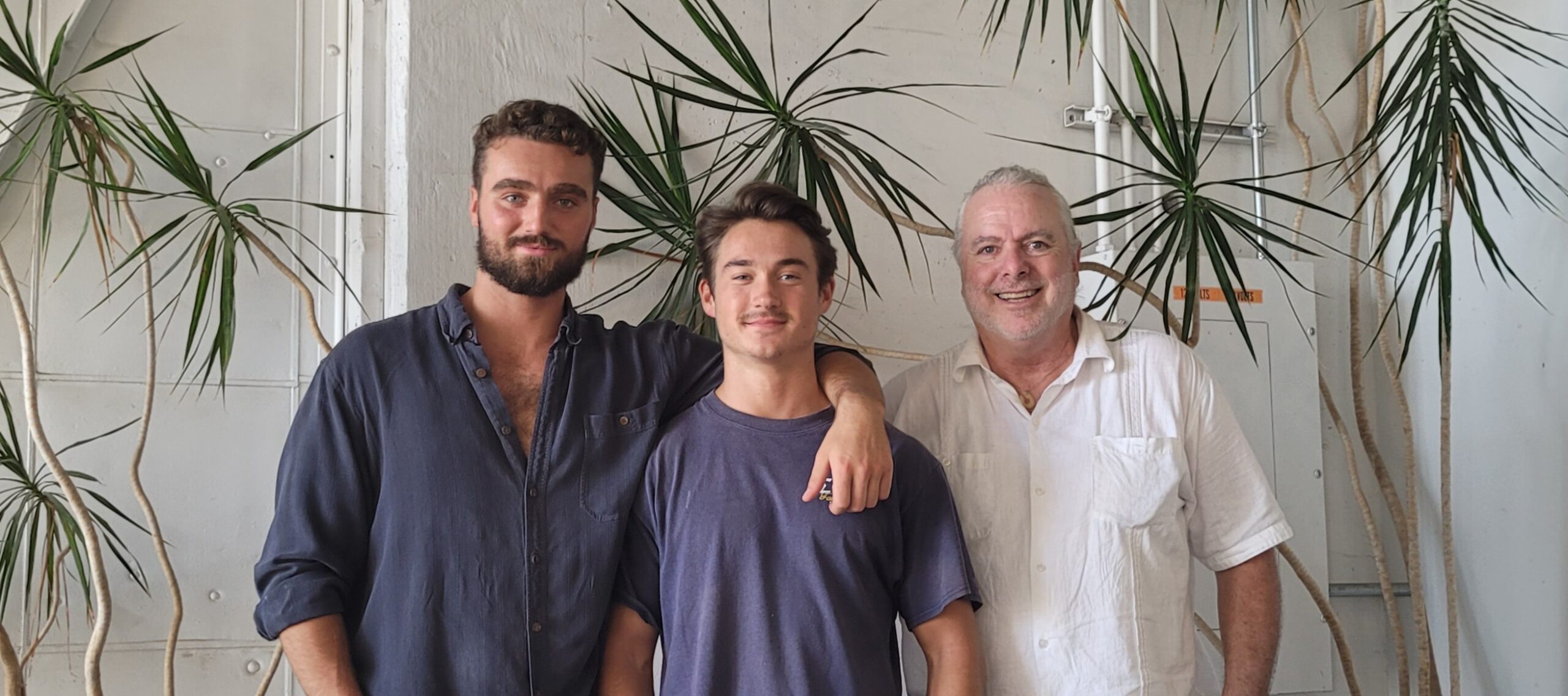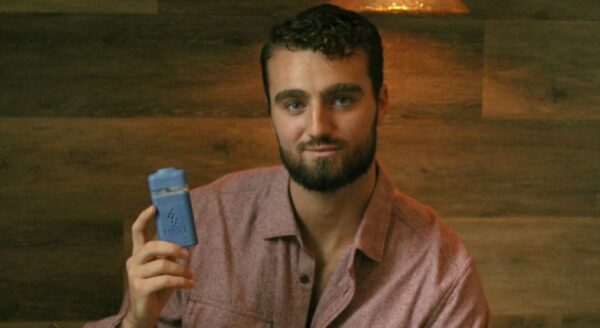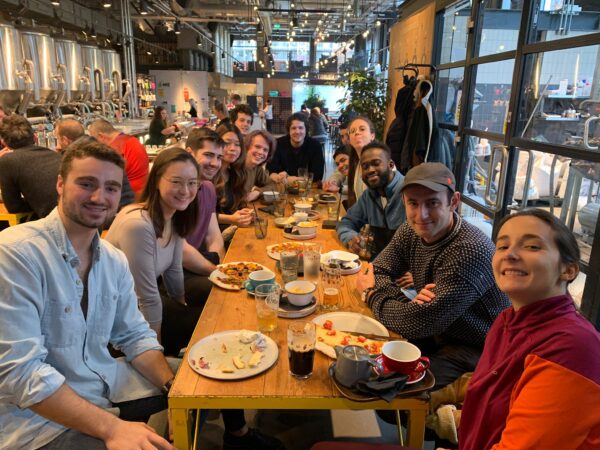What is Miist Therapeutics
Q: Can you briefly introduce yourself and your startup?
A: I’m Dalton Signor, the founder of Miist Therapeutics. Our core innovation is a smart inhaler that utilizes embedded software to regulate medication dosages. This adaptable platform can be paired with various medications and compounds, making it possible for us to seek FDA approval for new treatments in different disease states. The key advantage is our ability to personalize the medication dosage delivered to the patient via our technology. Currently, our primary focus is gaining FDA approval for our inhaled treatment for smoking addiction.
Q: Can you share the story of how you met your co-founder and how the idea for Miist came about?
A: My journey with Miist and finding my co-founder differs from the typical path. I entered Entrepreneurs First with my startup idea already in mind, having worked on it during my school days. The program was filled with brilliant minds, but their expertise was primarily in software and artificial intelligence, not in hardware engineering which was crucial for building a physical inhaler. I didn’t meet my co-founder through the program, and Entrepreneurs First was accommodating, allowing me to seek a co-founder outside of their network. Eventually, I connected with my co-founder in California, and we’ve been running the company together ever since. Although my situation wasn’t the norm, Entrepreneurs First was open to exceptions, supporting unique circumstances if they believed in the venture.
Why Entrepreneurs First
Q: What motivated you to join Entrepreneurs First?
A: I submitted my application to Entrepreneurs First around two years ago in the summer of 2021. Back then, I was a student, and I stumbled upon the program, probably through LinkedIn or a similar platform. It caught my interest, so I reached out to them. Following a few promising conversations, I received my acceptance into the program roughly a month later.
Entrepreneurs First’s Application Process
Q: Can you provide an overview of the application process for Entrepreneurs First?
A: From what I can recall, the application process was predominantly interview-based. I had several conversations, primarily with someone involved in talent acquisition. The focus was often on what sets you apart from the average person because there’s a belief that unique individuals are the ones capable of launching successful startups. Much of it revolved around demonstrating your commitment to tackling challenging endeavors and highlighting your distinctive talents that could be applied to starting a company. It was quite an interesting process.
Q: Any tips you’d like to share about the specific assessment criteria used in the selection process?
A: Sure, there were several assessment criteria they used. I don’t recall all of them, but a few stuck with me. First, they looked at your technical acumen, essentially how deep your technical knowledge goes. Another category was commercial readiness, meaning if you had any experience within a commercial organization or skills that could translate to it. You had to fit into one of these two categories; no technical skills and no commercial readiness would likely make you a less ideal candidate. If you had one, you could find a co-founder to complement your missing skills. The third category was somewhat broader, assessing how unique or different you were. It might have been officially termed as “uniqueness,” but I remember it as “weirdness.”
We discussed a variety of non-business-related topics, like my interest in outdoor activities, and even sleeping outside to see if I could make it through the night. The specifics weren’t crucial; they seemed more interested in individuals who were comfortable doing unconventional things. This makes sense, as the entrepreneurial journey often involves taking paths that others might not comprehend or follow. They were looking for people unafraid to embrace the unconventional, so they aren’t deterred by the judgment or resistance they encounter when tackling the challenges of building a company.
Accelerator Experience and Funding Details
Q: What does the program at Entrepreneurs First include?
A: After getting accepted, they are excellent at facilitating the setup process. In my case, since I was in the UK for a relatively short period, I didn’t need a visa. However, they are highly supportive if a visa is required, assisting you in figuring out the logistics. Before the program officially commenced, there was an initial launch night where people could get to know each other, typically held a week or two before. I recall it being a weekend event. They were accommodating even when I couldn’t make it due to being in the US.
The program includes a stipend, and they handle the logistics to ensure you get paid promptly. Once you arrive at your designated location, in my case, London, it’s pretty much a dive right into the deep end. They bring everyone together at the office, and from there, you’re left to your own devices to start meeting people, discussing ideas, forming teams, and working on various projects. While they do have targeted sessions on specific topics, the majority of the time is essentially hands-off; they encourage you to ideate and collaborate with others. They are there to assist whenever needed but trust you to drive your innovation.
Q: Are there mentors available for guidance during this period, aside from training sessions?
A: Yes, absolutely. Once you’re working on an idea as an individual or part of a team, you are paired with Entrepreneurs in Residence, or EIRs. These individuals are seasoned entrepreneurs who have achieved success in their careers. Many of them have experience starting and selling companies, and a few have a background in investing. They called these mentors venture partners. Even today, I maintain contact with the venture partner I was paired with during my time there. He built a company that was eventually acquired by Twitter and achieved remarkable success.
The program involves weekly calls with these mentors, and you can reach out to them anytime through Slack, email, or other channels to ask questions and seek guidance. They are a valuable resource to support you on your entrepreneurial journey.
Q: Did you receive funding through the program?
A: Yes, we did receive funding through Entrepreneurs First (EF). The program is divided into stages; the first three months are dedicated to finding a partner and forming a company. If you don’t have a partner by the end of this period, you’re out of the program. If you successfully progress beyond that phase, there’s an additional period of about two months focused on building. After this, you present your pitch to an investment committee, and they select a few companies for investment. In our class, I think they funded approximately eight companies, including ours. EF provided us with a low six-figure investment in USD, and they also introduced us to an angel investor who co-invested alongside them. This funding round became our pre-seed funding, which we used for further development. The exact amount we received from EF was a little over a hundred thousand USD.
The Biggest Benefits of the Program
Q: Besides the funding, what were the most significant benefits you gained from the program?
A: One of the most valuable aspects of the program was the relationships formed with other participants. While many participants might not succeed in the long run, a handful of companies, including ours, have gone on to raise substantial amounts of funding. These connections are unique, as we all started from scratch, with nothing but ideas when we entered the program, and have since evolved with full VC backing. This shared journey makes it easy to collaborate, share insights, and provide investor introductions. It’s a network where trust and camaraderie are strong because we all started from the same place, and it never feels like someone is trying to exploit your current position. It’s a supportive and collaborative community built on shared experiences and a genuine desire to help one another.
Q: Were there any significant moments or particularly surprising and inspiring experiences during the program?
A: It wasn’t so much a specific moment but more of an overarching feeling throughout the program. For individuals fresh out of school, especially undergraduates or even those with master’s degrees, it’s common to be surrounded by intelligent peers on campus. However, if you’re truly committed to launching a startup, you’re already a unique individual among your campus peers due to your aspirations. Entrepreneurs First brings together a cohort of around 50+ individuals, each selected as some of the brightest minds, all sharing a common desire to start a company. This dynamic fosters incredibly enlightening conversations, discussions on ambitious topics, and a pervasive spirit of determination and ambition within the program’s environment. It’s a unique community of exceptionally driven individuals where the norm is to be working on solving the biggest problems our society and our world face, which is quite an inspiring thing to be a part of.
Miist Therapeutics Journey and Future Plans
Q: What’s the current status of the company post-program?
A: Currently, we’re in the midst of two significant developments. Firstly, we’re in the process of securing a new round of financing, which is going well, largely thanks to the awesome team at 1517 Fund that has decided to lead this round. Secondly, we’re planning to use the funds for our phase one clinical study that starts in January ‘24, marking the first time we’ll be testing our treatment with human subjects. This marks a significant transition from the research and development stage, and it’s a crucial step as we move towards FDA approval for our lead smoking cessation asset. This clinical data also validates the platform and will set us up to begin new development programs with pharma and biotech partners that are developing their own inhaled drugs and want to use our technology to deliver them.
Q: How many people are currently on your team?
A: Our company has three full-time team members. We maintain a lean in-house team consisting of myself, our CTO Jeff Schuster, and our Head of Research and Development Eric Ezerins. For tasks and capabilities beyond our core areas of expertise, such as electronics development or clinical operations, we collaborate with external groups to keep our team small and focused.
Final Advice
Q: Any final tips for founders considering applying to Entrepreneurs First?
A: If you’re thinking about applying, the best advice I can offer is to demonstrate that you’ve taken action. When I applied, I had been working on my startup for about a year, even though our progress wasn’t substantial during my time at university. However, I was consistently working on it, trying to build a team, and facing challenges like people flaking, quitting, or needing to be let go. Sharing these experiences was valuable during the application process. So, the most important thing is to show your commitment to building something by actually building it. Also, don’t hesitate to reach out to Entrepreneurs First, regardless of where you are in your academic or professional journey. I was the only one in my class who came directly from undergrad, but they still welcomed me. There was also another really young person in my cohort who had already dropped out of his undergrad a year or two earlier and was just working on startups. So, no matter where you are, from undergrad to PhD or anywhere in between, if they see potential in you and believe you’re a good fit, they’ll be interested in having you onboard. Don’t hesitate to make that initial contact.



